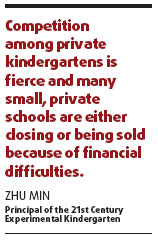Hot on the Web
Class warfare for kindergarteners parents
By Li Xiang (China Daily)
Updated: 2009-08-18 11:37

Figures from the commission showed it invested 741 million yuan in preschool education last year, just 3.1 percent of the capital's entire education spending.
"Money is never the problem, the government invests hundreds of millions of yuan each year in colleges and universities," said Niu. "The problem is that for a long time it did not realize that preschool education was just as vital as higher education."
The committee report said the number of preschools had fallen 58 percent since 1996, with many public or State-owned kindergartens being closed or left to deal with harsh market forces during the process of privatization. However, the demand for places has continued to grow at a steady pace.
The city witnessed baby booms in 2007, when parents were desperate to have a "happy and honest" child in the Year of the Pig, and last year, when many couples wanted an Olympic baby.
The capital has welcomed 460,000 babies since 2006, while the influx of migrant workers with children has also added to the heavy burden on its preschool education capacity.
The Beijing Municipal Education Commission in June invested 30 million yuan to create 300 new classes, but many parents complained the move was unlikely to make an impact in a city with around 216,000 children under age of three, according to the CPPCC report.
Preschools are not included in the country's nine-year compulsory education program, which costs families with hukou just a small amount of money, and, according to the Ministry of Education, accounted for just 1.3 percent of the entire 156-billion-yuan public education budget last year.
The international average for preschool investment is 3.8 percent, while in some European nations such as Denmark, Sweden and France it exceeds 10 percent.
Experts have also criticized China's lack of a preschool education law, as well as a mid- to long-term plan for development, and urged the Ministry of Education to improve or draw up legislation and increase spending on public kindergartens.
"The government should not simply increase spending on kindergartens that are already in good condition, however. More money should be used to build new kindergartens so that more children could be enrolled," said Niu. "The government must start playing a leading role in preschool education."
In 2007, about 129,000 kindergartens across the country had places for 23.5 million children, showed Ministry of Education figures, translating into an enrollment rate of 44.6 percent. And although the central government set a target of 55 percent in its 11th Five-Year Plan (2006-10), the goal is still considered low compared the average of 77 percent in the developed countries.
China even lags behind fellow developing nations like Brazil and Argentina, where the kindergarten enrollment rate is 69 percent and 66 percent respectively.
The gap between urban and rural areas is also worrying, say many education experts. The enrollment rate in cities such as Beijing and Shanghai is as high as 80 percent, but in rural areas the average is only 35 percent.
"Preschool education is a critical period in a child's development," said Han Linqing, a national inspector for the Ministry of Education. "It often has a life-long influence on the development of a child's behavior, character and personality.

"Studies have also shown that preschool education has the highest return rate. For instance, a study in the US showed that every dollar the government there invested in preschool education could generate more than $17 in social benefit."
He said providing universal preschool education and narrowing the gap between urban and rural areas is vital, and urged the government to look at including it in the free compulsory system.
While public kindergartens suffer from the lack of government support, many private schools are also experiencing financial problems.
Tuition fees can vary widely and, in Beijing alone, at least 33 percent charge at least 5,000 yuan a month, according to the local CPPCC report, while some luxury international kindergartens charge as much as 30,000 yuan.
Rent and recruitment are the biggest costs faced by private firms, said Zhu Min, principal of the 21st Century Experimental Kindergarten in Beijing.
"The rent is very high these days and it accounts for almost a quarter of our total costs. We are a private kindergarten but we don't run for profit, all our surplus cash is used to maintain and upgrade the school's facilities," she said.
"Competition among private kindergartens is fierce and many small, private schools are either closing or being sold because of financial difficulties. We're also worried the situation will get even tougher after the birth rate peak."
She said the government could support private kindergartens by offering loans at favorable rates, and added: "Small and medium-sized business loans would help many kindergartens expand so they could meet the growing demand."
Education experts are also advocating a school voucher system to help poor families and migrant workers.
Shanghai has already introduced a voucher scheme for public schools, which, thanks to money from the local authorities, allows many low-income families to send their children to kindergartens.
The standard of teaching in China's kindergartens have also proved a big concern for parents, with only 11.2 percent of the 1,000 people who responded to an online poll conducted by China Youth Daily saying they were satisfied with the quality of preschool teachers.
"The problem is many kindergartens have difficulty recruiting qualified teachers as there is a real shortage of graduates with preschool education degrees," said Niu at the Beijing committee of the CPPCC.
The China Education Law requires kindergarten teachers to have at least an associate degree before they are allowed in the classroom, but the number of universities that provide the degree is very limited.
In Beijing, two colleges - Beijing Normal University and Capital Normal University - mainly offer degrees in preschool education. Both enroll just 40 to 50 students each year and figures showed that, of those who qualified, most chose not to pursue a career teaching kindergarten after graduation.
"We need to establish a professional college of preschool education," added Niu. "The government should also make the job more attractive to young people by raising the benefits and the social status of preschool teachers."









